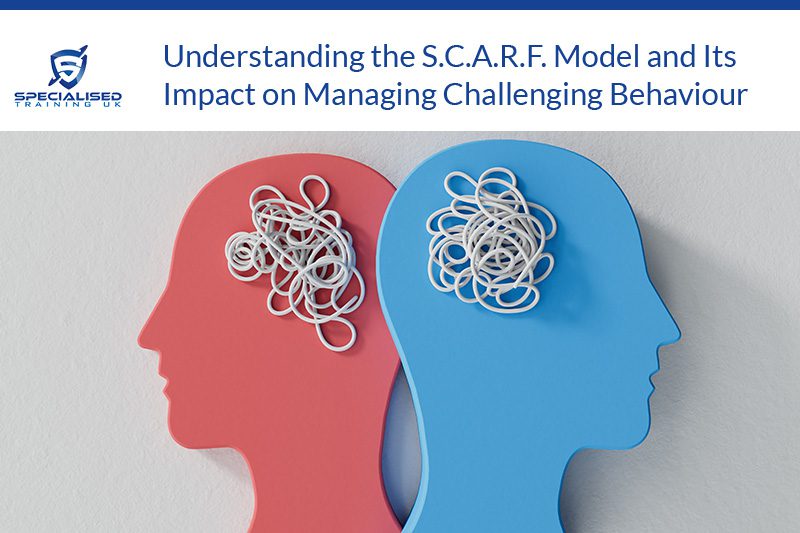The S.C.A.R.F. model, developed by Dr David Rock, is a framework that helps us understand human behaviour and motivation. It identifies five key domains that influence our social interactions: Status, Certainty, Autonomy, Relatedness, and Fairness.
By applying the S.C.A.R.F. model, Managing Challenging Behaviour Training courses equip professionals in the care and education sectors with the tools to better understand and respond to the needs of those they support. This approach not only improves behaviour management but also enhances the overall quality of care and education provided.
Understanding these elements can significantly improve the way we approach managing challenging behaviour, particularly in care and educational settings.

The S.C.A.R.F. model
- Status refers to our relative importance compared to others. In the context of managing challenging behaviour, acknowledging and validating individuals’ sense of status can reduce conflict and improve cooperation.
- Certainty is about the need for predictability. Specialised training courses, such as Managing Challenging Behaviour Training, teach professionals to create structured and clear environments. This reduces anxiety and helps individuals feel more secure.
- Autonomy emphasises the importance of control over one’s actions. By offering choices, carers and educators can empower those they support, thereby reducing negative behaviours.
- Relatedness relates to the sense of connection and belonging. Specialised training equips professionals with the skills to create positive relationships, and build rapport and trust, which are foundational to managing challenging behaviour effectively.
- Fairness is about perceived equity. Unfair treatment can trigger negative responses. Training helps professionals to maintain consistency and transparency, fostering a fair environment that promotes positive behaviours.
Promoting positive outcomes
Understanding and addressing the core human needs of status, certainty, autonomy, relatedness, and fairness can transform interactions and reduce instances of challenging behaviour.
This holistic approach not only enhances the skills of those in care and educational roles but also ensures that individuals feel respected, understood, and motivated.
Book one of our courses or contact us to find out more
- https://specialisedtraininguk.com/managing-challenging-behaviour/
- https://specialisedtraininguk.com/conflict-management/
- https://specialisedtraininguk.com/positive-handling-training/
- 01372 231 011 or 07787 504 622
- Email: info@specialisedtraininguk.com
- Use the contact form on this website.
What our clients say:
“The training is interesting and covers the whole positive handling information. The practise is really good, all was clear and we learnt a really useful techniques. Thanks to the whole team!” Marina S.

Comments
Comments are closed.